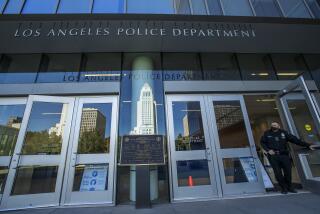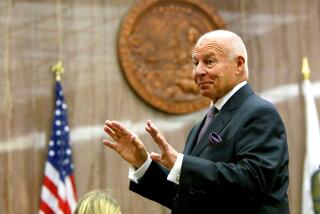Lawyer Discipline Systems Held Inadequate to Protect Public
- Share via
SAN FRANCISCO — Lawyer discipline systems are not adequately protecting the public from incompetence and neglect from among the nation’s 725,000 lawyers, a special commission of the American Bar Assn. has concluded.
The panel, in a broad-ranging report to be formally issued today, said that while disciplinary systems are generally effective in punishing serious misconduct, legitimate complaints about lawyers’ services and fees are too often turned away.
In 1988, the year the commission studied, more than 44,000 disciplinary complaints were dismissed without investigation, most because they failed to charge unethical conduct that would subject an attorney to disbarment, suspension or other punishment.
The group recommended a long list of reforms--including assigning a universal identification number to each lawyer in the country to prevent attorneys disbarred in one state from practicing law in another without detection.
Charles S. Vogel of Los Angeles, president of the State Bar of California, welcomed the report but noted that “virtually all” of the recommendations had already been implemented in this state.
The eight-member ABA Commission on Evaluation of Disciplinary Enforcement was created in 1989 to study attorney discipline systems throughout the country. Its report will be presented to the ABA House of Delegates, the policy-making body of the association, next February. If adopted, the recommendations will be submitted for consideration to the state and federal courts, which have final disciplinary authority over lawyers.
In its 103-page report, the commission found that the failure of disciplinary systems to deal effectively with complaints about the quality of services and size of fees was having severe repercussions on the legal profession.
In some areas, it said, up to 90% of all complaints filed against lawyers were summarily dismissed. While some complaints may have been unwarranted, the large number of dismissals shows a substantial gap between client expectations and the regulatory process, the commission said.
The vast majority of complaints charge minor instances of misconduct, neglect or incompetence that may be technical violations of the ethical rules of the profession but seldom result in formal proceedings, the commission said.
The commission found that the “greatest single source of public distrust” was secrecy in disciplinary proceedings. The public, it said, would not accept claims from the profession that secret proceedings were necessary to protect lawyers’ reputations from false complaints.
Among other things, the commission recommended that:
* Disciplinary authorities should remain independent of bar associations to avoid improper influence and the appearance of impropriety.
* Bar organizations should establish mandatory arbitration of fee disputes, voluntary proceedings to settle other client complaints and programs to help lawyers who abuse drugs or alcohol.
* Complaints against lawyers should be open to the public from the time they are filed by clients, and courts should establish procedural rights for complainants to make sure they are fully informed about subsequent investigation of their charges.
* Administrative proceedings--separate from regular disciplinary proceedings--should be established to handle minor complaints, or those that do not involve misappropriation of funds, commission of a crime, or other serious misconduct or incompetence. Clients could be compensated for a lawyer’s substandard performance with a fee adjustment or other arbitrated or mediated settlement.
Vogel pointed out that California recently established the nation’s first full-time independent Bar Court to handle lawyer-discipline cases. The Bar also provides a panel to hear appeals of dismissals of complaints and has set up programs to arbitrate fee disputes and other disagreements between lawyers and clients.
More to Read
Sign up for Essential California
The most important California stories and recommendations in your inbox every morning.
You may occasionally receive promotional content from the Los Angeles Times.













